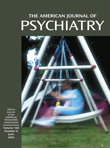Risk Factors for Depression Among Elderly Community Subjects: A Systematic Review and Meta-Analysis
Abstract
OBJECTIVE: The goal of this study was to determine risk factors for depression among elderly community subjects. METHOD: MEDLINE and PsycINFO were searched for potentially relevant articles published from January 1966 to June 2001 and from January 1967 to June 2001, respectively. The bibliographies of relevant articles were searched for additional references. Twenty studies met the following six inclusion criteria: original research reported in an English or French publication, study group of community residents, age of subjects 50 years or more, prospective study design, examination of at least one risk factor, and use of an acceptable definition of depression. The validity of studies was assessed according to the four primary criteria for risk factor studies described by the Evidence-Based Medicine Working Group. Information about group size at baseline and follow-up, age, proportion of men, depression criteria, exclusion criteria at baseline, length of follow-up, number of incident cases of depression, and risk factors was abstracted from each report. RESULTS: Follow-up of the inception cohort was incomplete in most studies. In the qualitative meta-analysis, risk factors identified by both univariate and multivariate techniques in at least two studies each were disability, new medical illness, poor health status, prior depression, poor self-perceived health, and bereavement. In the quantitative meta-analysis, bereavement, sleep disturbance, disability, prior depression, and female gender were significant risk factors. CONCLUSIONS: Despite the methodologic limitations of the studies and this meta-analysis, bereavement, sleep disturbance, disability, prior depression, and female gender appear to be important risk factors for depression among elderly community subjects.



